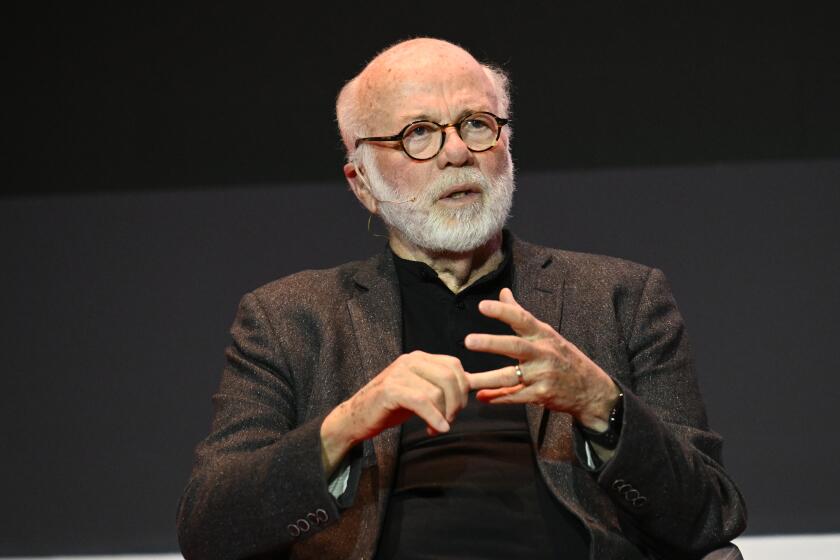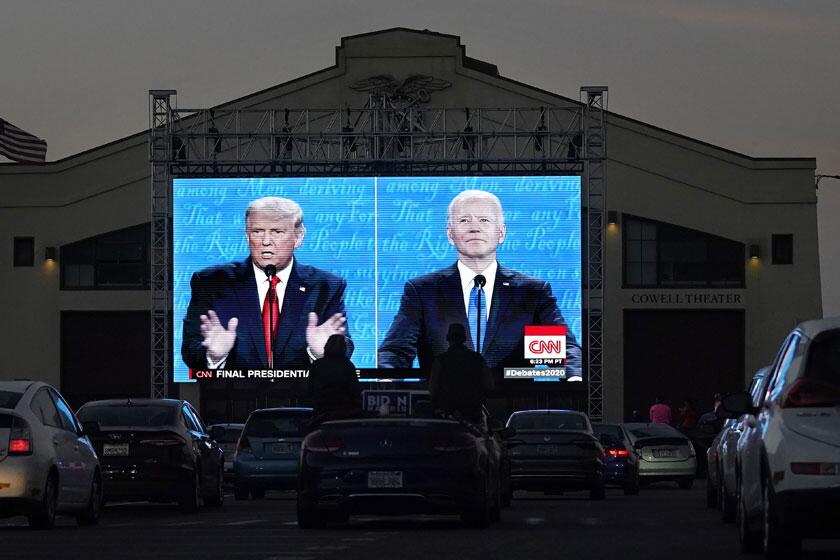Column: He lost by 5 votes and conceded graciously. Trump could learn something here

Joe Simitian long had his eye on a seat in Congress. It would have been a fine way to cap his 40-year political career.
“I viewed it as an opportunity to improve the lives of the people I represent in a different way at a different level,” the Silicon Valley Democrat said.
Little did he know.
On election night, March 5, Simitian was running second in a field of 11 candidates vying for a Bay Area House seat. Under California’s top-two primary system, that meant a spot in November’s runoff against the top finisher, former San José Mayor Sam Liccardo.
Then, the race turned into a cliffhanger. As more ballots were counted, Simitian bobbed between second and third place, sometimes by just a handful of votes. For a time, the race for second was tied. Finally, last week, the contest ended. Simitian finished third, behind Democratic Assemblyman Evan Low.
The margin was five votes.
What happened next was striking: Simitian bowed out of the race. Swiftly. Unreservedly. Graciously.
“I lost, and I concede,” he said in a written statement. “I trust the process, and I accept the result.”
If only a certain reckless ex-president had acted with as much responsibility and dispatch. Think how much better off the country would have been these last several years.
David Hume Kennerly quit the Gerald Ford Foundation board when the group refused to honor Liz Cheney because, Kennerly says, it’s afraid of Donald Trump.
It’s not that hard, really.
“It’s a pretty simple and straightforward proposition,” the Santa Clara County supervisor said in a conversation this week. “If you come up short, you acknowledge that fact, you congratulate the winners and you say thank you to the people who helped get you there.
“I mean, I feel like that’s something every 8-year-old kid in America should have learned from their folks.”
Apparently not.
Simitian, 71, began his political career on the Palo Alto school board in 1983. Over the next several decades, he climbed the rungs of state and local government. In Sacramento, he wrote California’s hands-free cellphone law and legislation expanding green energy and early education.
He began raising money for a congressional bid more than a decade ago and finally got his shot at a seat this year when the Democratic incumbent, Anna G. Eshoo, announced she would step down at the end of her term in January.
It was a rare opportunity — Eshoo has represented parts of San Mateo and Santa Clara counties in Congress for 30 years — and there was no lack of interest. Candidates raised nearly $11 million and outside groups chipped in millions more, making the contest one of the most expensive congressional races in the country.
The suspenseful count that pushed the primary into a lengthy overtime was “a bit of a roller-coaster ride,” Simitian said with notable understatement. “One day you’d be up five. The next day, you’d be down one. The next day, you’d be up three.”
He exerted little energy on what-ifs and spent no time at all staring sleeplessly at his bedroom ceiling.
“Certainly there are things where you think ... I might have done this differently, I might have done that differently,” Simitian said evenly. “But you really can’t second-guess yourself too much. That’s not a productive exercise.”
Besides, Simitian said, there was the prospect of moving on to a November runoff against Liccardo, his fellow Democrat.
“Candidly, my thoughts were more about, if I’m fortunate enough to have the opportunity to go forward, how do we recalibrate?” Simitian said. “How do we chart a course that will be successful” in the general election?
When the final results came in, following an official recount, Simitian drafted his concession statement with help from his wife, Mary Hughes, a veteran political strategist. He posted a smiling picture of the two, taken early in the campaign, and announced his exit from the race in a jokey fashion.
“The good news is the 16th congressional district’s long painful exercise counting the votes is over!” he wrote. “The not-so-good news: we have come up short.”
Simitian described himself as disappointed, but not sad.
“You don’t work that hard that long to reach that goal and find that, in the flukiest of ways, your aspirations are unrealized. That’s disappointing. There’s no question about it,” he said, elaborating on his written statement during a lunch break in Tuesday’s Board of Supervisors meeting.
But, he went on, “How can I be anything but appreciative of the fact that I’ve had the opportunity to do the kind of work that I really find satisfying and [notch] a dozen straight election wins before coming up five votes short?”
Freed of responsibilities as speaker, the Bakersfield Republican can devote himself to what’s long been his forte: campaigns and elections. Payback is part of his agenda.
The result of the congressional primary was, of course, infinitesimally closer than the 2020 presidential race, which Joe Biden won — clearly and unequivocally — by 7 million votes and a not-close margin in the electoral college.
Donald Trump’s refusal to acknowledge his defeat has not only kept the country on edge the last several years but also set a template for other sore losers, such as failed Arizona gubernatorial hopeful Kari Lake, to make similarly false claims.
The result, repeated polls have shown, is a dangerous erosion of faith in our elections and wobbling system of democracy.
That’s why Simitian’s willingness to accept defeat without whining or casting false aspersions stands out — though, it should be said, we’ve come to a sad state in our politics when doing the right thing is seen as somehow an act of chivalry.
“It’s sort of a simple matter of decency,” Simitian said.
He’s right. We could use a lot more of it these days.
More to Read
Get the latest from Mark Z. Barabak
Focusing on politics out West, from the Golden Gate to the U.S. Capitol.
You may occasionally receive promotional content from the Los Angeles Times.









